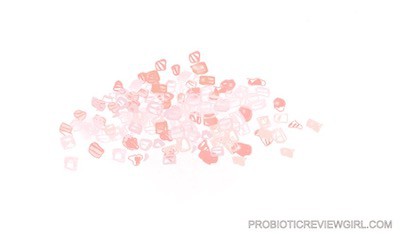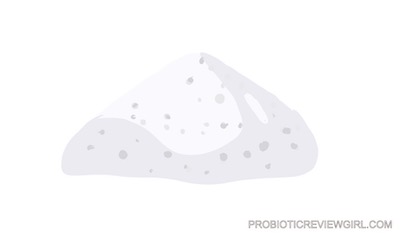Does Iodized Table Salt Kill Probiotics During Fermentation?
Meta Analysis has shown the importance of good gut health for serotonin production, immune health, and a whole host of other bodily functions.
Research has also also shown that Dysbiosis, an imbalance of gut good & bad bacteria is often found in people with issues like IBD and even skin conditions like psoriasis.
A modern western diet with high processed foods, stress, and antibiotic usage are all just some of the things that can alter the bacteria in your microbiome.
In this guide, I am going to show you how you can lacto-ferment vegetables that are full of Lactobacillus probiotic bacteria whilst using iodized table salt.
What Are Probiotics?
Probiotics are a type of gram-positive friendly microorganism that is not produced naturally by the human body. The most popular studied types of probiotic bacteria include Lactobacillus, Bifidobacteria, Streptococcus, and Bacillus Soil Based strains.
When taking probiotic bacteria for the first time you may experience initial symptoms like bloating, gas, and diarrhea whilst your microbiome accepts the billions of new friendly bacteria. Later on, in this guide, I will share why those symptoms can also be a sign that your fermented vegetables are full of probiotics.
Research has shown that the probiotic bacteria in your gut may be helpful for immune health, inflammatory cytokines, mental health, and even skin health. Since the body cannot produce probiotic bacteria naturally by itself it's important to get probiotic bacteria from supplements or through fermented vegetables which is a far more cost-effective solution.
Can You Use Iodized Table Salt?

Pink Himalayan Mineral Salt
Whilst doing my research initially I came across many blogs that swore I had to use fancy mineral seal salts like pink Himalayan salt or my fermented vegetables wouldn't work. Looking at the high prices at places like Walmart for the mineral salt was a little off-putting, especially with the current cost of living.
I was grateful to eventually find experts like Maangchi who set the record straight by explaining that you can use any kind of salt for fermenting things like Kimchi. She said that all salt is basically all the same thing. I have since tried making my own fermented vegetables with plain table salt and can confirm it worked perfectly well.
The reason I know is that after eating it for the first time I get the classic initial probiotic side effects like stomach rumbling that show the probiotic bacteria is working in my intestines. This is a sign that the iodine and anti-caking agents in the table salt didn't kill any of the gram-positive probiotic bacteria.
Iodized Table Salt On Bacterial Diversity In Sauerkraut Study

Iodized Table Salt
If you don't believe MaangChi or me then this 2018 study published in ScienceDirect should be able to build more confidence in the use of using cheap table salt for your fermented vegetables. The study carried out by the Federal Research Institute of Nutrition and Food, Department of Microbiology and Biotechnology looked at the effects of Iodilzed Table Salt and non Iodized table salt on bacterial diversity during the fermentation of sauerkraut.
The results showed that using the starter cultures produced faster establishments of Lactic Acid Bacteria. Without the starter culture, it took longer for the bacteria to grow but interestingly there was said to be more diversity of probiotic bacteria that included enterobacteria, pseudomonads, and lactococci probiotic bacteria. It was however noted that the Iodize table salt did appear to inhibit the growth of some yeasts which could potentially include Saccharomyces Boulardii.
The experts in the study shared that "The use of iodized salt did not statistically significantly influence microbial populations in the fermentation." The key takeaway from this research was that using table salt with iodine did not inhibit or kill the growth of nonyeast probiotic bacteria. The next time you find a blogger telling you to buy pink Himalayan salt, feel free to share this article with them.
Final Thoughts
If you want to make your own delicious fermented vegetables all you need is some form of a clean sealed container, clean sterile water, vegetables of your choice, and some cheap table salt from any store. You can make fermented purple cabbage which is a favorite of mine in as little as 1 week and store it in the fridge for up to 30 days.
Don't eat your fermented vegetables if you notice a foul smell or any visible mold. Whilst your probiotic bacteria adjust to the billions of new gram-positive bacteria you may notice some initial side effects like bloating, flatulence, or minor diarrhea. This usually passes and is a good sign that your fermented vegetables have some good potent probiotic bacteria.

Alicia Harper is a NASM-CNC Certified nutritionist and the editor of ProbioticReviewGirl.
After suffering from recurrent gut issues she spent years researching Probiotics and the microbiome.
She has tested 29+ different Probiotics and is a probiotics expert. As a probiotic fanatic, she has valuable knowledge to share with the world.